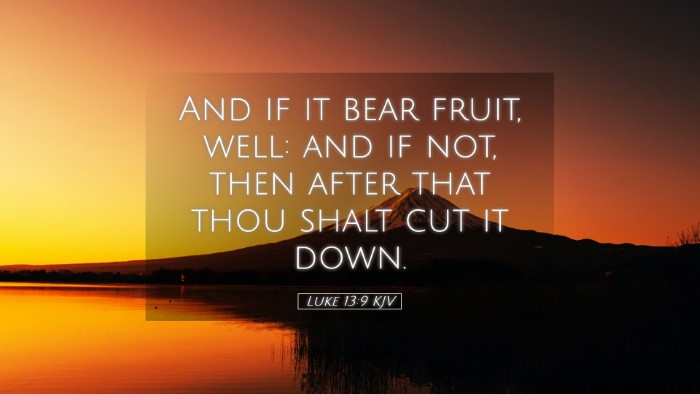Commentary on Luke 13:9
Verse Overview: Luke 13:9 states, "And if it bear fruit, well: and if not, then after that thou shalt cut it down." This verse is part of a parable taught by Jesus about the barren fig tree, which serves as a powerful metaphor for spiritual fruitfulness.
Contextual Background
The Parable of the Fig Tree, found in this chapter, emphasizes God's patience and the necessity of bearing fruit in the life of His followers. In the surrounding verses, Jesus reflects on themes of repentance and judgment, warning the people about the consequences of unfruitfulness.
Summary of Key Insights
- God's Patience: Matthew Henry emphasizes God's longsuffering nature, suggesting that the tree's owner represents God's mercy and grace. The delay in judgment gives the tree (and, symbolically, sinners) a chance for repentance and renewal.
- The Importance of Bearing Fruit: Albert Barnes expounds on the necessity of producing good fruit, a metaphorical representation of righteous living and spiritual maturity. If a believer is to remain in God's garden, their life must showcase the virtues of faith, love, and good works.
- The Warning of Judgment: Adam Clarke cautions readers that there is a limit to God’s patience. If the fig tree continues to be barren, it will eventually face judgment. This serves as a somber reminder of the fate awaiting those who persist in spiritual barrenness.
Theological Implications
This verse offers profound theological implications regarding God's nature and expectations from humanity. The gardener in the parable, pleading for another chance for the fig tree, represents Christ’s intercession for humanity:
- Intercession of Christ: The gardener asking for an extension of time can be seen as a metaphor for Christ's role in interceding for sinners, giving them time to repent and turn to God.
- The Final Judgment: While mercy is extended, the threat of eventual judgment looms over the unfruitful. This duality in God’s character — mercy and justice — is critical for understanding His dealings with humanity.
- Responsibility of Believers: Believers are called not only to profess their faith but to live it out actively by producing fruit in line with the teachings of Christ. This narrative challenges Christians to reflect on their own lives and assess the fruit they are bearing.
Practical Applications
When reflecting on Luke 13:9, pastors, theologians, and students should consider the following practical applications:
- Self-Examination: Regularly evaluate one’s spiritual life. Are you bearing fruit in keeping with repentance? Engage in spiritual disciplines that encourage growth, such as prayer, studying the Scriptures, and fellowship.
- Evangelism and Encouragement: Encourage others in their spiritual journey. Just as the gardener intercedes, believers are called to support one another, helping to cultivate faith and obedience in the lives of those around them.
- Hope in Restoration: Maintain hope in God’s willingness to restore the barren, recognizing that through the grace of Jesus, lives can be rejuvenated and transformed.
Conclusion
Luke 13:9 serves as a poignant reminder of God’s grace, patience, and the imperative call for His people to bear fruit. The interplay of mercy and responsibility underscores the essence of the Christian faith, calling each believer to action and to bear witness to the transformative power of Christ in their lives.


